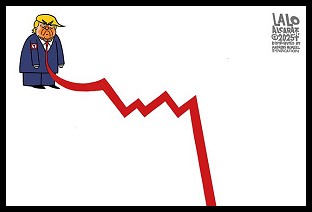Measure, Co-Sponsored by 13 Dems, Would Prohibit 'Voter Supression' Tactic as Used in Florida in 2004 by Former Rove Associate, Interim US Attorney Tim Griffin...
 Thirteen Democratic Senators have introduced a bill that would outlaw "voter caging," the practice of sending mail marked "Do Not Forward" to a targeted list of voters in hopes of using the returned mailings as a basis to challenge the right of the voters to vote.
Thirteen Democratic Senators have introduced a bill that would outlaw "voter caging," the practice of sending mail marked "Do Not Forward" to a targeted list of voters in hopes of using the returned mailings as a basis to challenge the right of the voters to vote.
The tactic was used by Republican operatives in both the 2000 and 2004 election, despite the Republican party having agreed in two consent decrees in 1981 and 1986 to end the practice.
A press release from Sen. John Kerry's (D-MA) office announcing the new bill is posted in full below.
"The practice of 'caging' is reprehensible and has absolutely no place in our democracy," Kerry says in the statement. "Here in America, every citizen, regardless of race, gender, religion or sexual orientation has the right to cast his or her vote. These are the very foundations of our democracy and this bill will ensure that we protect fundamental freedoms for millions of voters across our country."
 The press release goes on to refer to evidence, much of it reported over the years here at The BRAD BLOG, of GOP vote caging that took place in important swing states such as Florida, Ohio, and Pennsylvania during the 2004 election. Kerry's statement also points out the re-emergence of the topic earlier this year, after former DoJ staffer Monica Goodling testified to a Congressional panel that information concerning the involvement of former Karl Rove associate and GOP opposition researcher Tim Griffin in voter caging had not been fully disclosed during previous Congressional testimony.
The press release goes on to refer to evidence, much of it reported over the years here at The BRAD BLOG, of GOP vote caging that took place in important swing states such as Florida, Ohio, and Pennsylvania during the 2004 election. Kerry's statement also points out the re-emergence of the topic earlier this year, after former DoJ staffer Monica Goodling testified to a Congressional panel that information concerning the involvement of former Karl Rove associate and GOP opposition researcher Tim Griffin in voter caging had not been fully disclosed during previous Congressional testimony.
Goodling's revelations led to Griffin's sudden (and teary) resignation from his post as interim US Attorney in Arkansas, where he had been appointed by the DoJ under new provisions in the PATRIOT Act allowing such appointments without congressional approval.
The controversial practice of vote caging has been used primarily to target minority voters; evidence has shown that some who ended up on the caging lists were military personnel who were unable to return the mailings because they were deployed in Iraq and Afghanistan.
A DoJ investigation into Griffin's, and the GOP's, 2004 vote caging activities was then demanded by several U.S. senators last June. The American mainstream media have given little coverage to the issue of caging, despite original reporting from Greg Palast and the BBC prior to the 2004 Presidential Election.
In addition to Kerry, the original co-sponsors of the legislation include Senators Patrick J. Leahy (D-Vt.), Dianne Feinstein (D-Calif.), Russ Feingold (D-Wis.), Bill Nelson (D-Fla.), Sherrod Brown (D-Ohio), Amy Klobuchar (D-Minn.), Hillary Rodham Clinton (D-N.Y.), Sheldon Whitehouse (D-R.I.), Bob Menendez (D-N.J.), Barack Obama (D-Ill.), Charles Schumer (D-N.Y.), and Chris Dodd (D-Conn.)
UPDATE: Here's the actual bill [PDF]. Looks good from a quick read, though the part that allows the U.S. Elections Assistance Commission (EAC) --- a four-member commission appointed by the President, and which has proven tremendously inept and compromised in all manner of things --- to add new reasons why voters may be challenged is a concern. The EAC shouldn't be entrusted with anything, much less deciding criteria for challenging voters' right to vote. But that's just our knee-jerk opinion.
The press statement from Kerry's office, announcing "The Caging Prohibition Act," is posted in full below...
--- Click here for REST OF STORY!... ---


 Trump EPA Guts Enviro Justice Office: 'BradCast' 4/24/25
Trump EPA Guts Enviro Justice Office: 'BradCast' 4/24/25 'Green News Report' 4/24/25
'Green News Report' 4/24/25
 Nation's Largest Broadcaster Mandates News Outlets Hoax Viewers to Help Gut FCC Rules: 'BradCast' 4/23/25
Nation's Largest Broadcaster Mandates News Outlets Hoax Viewers to Help Gut FCC Rules: 'BradCast' 4/23/25 Trump's FCC on Precipice of Ending All Limits on Corporate Control of Local TV Stations
Trump's FCC on Precipice of Ending All Limits on Corporate Control of Local TV Stations GOP Earth Day 2025 Hypocrisies and Dilemmas: 'BradCast' 4/22/25
GOP Earth Day 2025 Hypocrisies and Dilemmas: 'BradCast' 4/22/25 'Green News Report' 4/22/25
'Green News Report' 4/22/25 Pope Francis Dies,
Pope Francis Dies, Sunday
Sunday  Sunday 'Zero Day' Toons
Sunday 'Zero Day' Toons Soc. Sec. Expert Warns DOGE Hastening Collapse, Privati-zation: 'BradCast' 4/10/2025
Soc. Sec. Expert Warns DOGE Hastening Collapse, Privati-zation: 'BradCast' 4/10/2025 'Green News Report' 4/10/25
'Green News Report' 4/10/25 Trump Blinks, Chaos Reigns, Markets Spike as Many Tariffs Remain Despite 90-Day 'Pause': 'BradCast' 4/9/25
Trump Blinks, Chaos Reigns, Markets Spike as Many Tariffs Remain Despite 90-Day 'Pause': 'BradCast' 4/9/25 SCOTUS Deportation Ruling Grimmer Than First Appears: 'BradCast' 4/8/25
SCOTUS Deportation Ruling Grimmer Than First Appears: 'BradCast' 4/8/25 'Green News Report' 4/8/25
'Green News Report' 4/8/25 Cliff Diving with Donald: 'BradCast' 4/7/25
Cliff Diving with Donald: 'BradCast' 4/7/25 Sunday 'Don't Look Down' Toons
Sunday 'Don't Look Down' Toons 'Green News Report' 4/3/25
'Green News Report' 4/3/25 'Mob Boss' Trump's Trade Sanctions Tank U.S., World Markets: 'BradCast' 4/3/25
'Mob Boss' Trump's Trade Sanctions Tank U.S., World Markets: 'BradCast' 4/3/25 Crawford Landslide in WI; Booker Makes History in U.S. Senate: 'BradCast' 4/2/25
Crawford Landslide in WI; Booker Makes History in U.S. Senate: 'BradCast' 4/2/25 Judge Ends Challenge to GA's Unverifiable, Insecure Vote System: 'BradCast' 4/1/25
Judge Ends Challenge to GA's Unverifiable, Insecure Vote System: 'BradCast' 4/1/25 Bad Court, Election News for Trump is Good News for U.S.: 'BradCast' 3/31
Bad Court, Election News for Trump is Good News for U.S.: 'BradCast' 3/31 Vets Push Back at Plan to Slash Health Care, 80K V.A. Jobs: 'BradCast' 3/27/25
Vets Push Back at Plan to Slash Health Care, 80K V.A. Jobs: 'BradCast' 3/27/25 Signal Scandal Worsens for Trump, GOP; Big Dem Election Wins in PA: 'BradCast' 3/26
Signal Scandal Worsens for Trump, GOP; Big Dem Election Wins in PA: 'BradCast' 3/26 'Emptywheel': Trump NatSec Team Should 'Resign in Disgrace': 'BradCast' 3/25/25
'Emptywheel': Trump NatSec Team Should 'Resign in Disgrace': 'BradCast' 3/25/25 USPS 'Belongs to the People, Not the Billionaires': 'BradCast' 3/24/25
USPS 'Belongs to the People, Not the Billionaires': 'BradCast' 3/24/25
 VA GOP VOTER REG FRAUDSTER OFF HOOK
VA GOP VOTER REG FRAUDSTER OFF HOOK Criminal GOP Voter Registration Fraud Probe Expanding in VA
Criminal GOP Voter Registration Fraud Probe Expanding in VA DOJ PROBE SOUGHT AFTER VA ARREST
DOJ PROBE SOUGHT AFTER VA ARREST Arrest in VA: GOP Voter Reg Scandal Widens
Arrest in VA: GOP Voter Reg Scandal Widens ALL TOGETHER: ROVE, SPROUL, KOCHS, RNC
ALL TOGETHER: ROVE, SPROUL, KOCHS, RNC LATimes: RNC's 'Fired' Sproul Working for Repubs in 'as Many as 30 States'
LATimes: RNC's 'Fired' Sproul Working for Repubs in 'as Many as 30 States' 'Fired' Sproul Group 'Cloned', Still Working for Republicans in At Least 10 States
'Fired' Sproul Group 'Cloned', Still Working for Republicans in At Least 10 States FINALLY: FOX ON GOP REG FRAUD SCANDAL
FINALLY: FOX ON GOP REG FRAUD SCANDAL COLORADO FOLLOWS FLORIDA WITH GOP CRIMINAL INVESTIGATION
COLORADO FOLLOWS FLORIDA WITH GOP CRIMINAL INVESTIGATION CRIMINAL PROBE LAUNCHED INTO GOP VOTER REGISTRATION FRAUD SCANDAL IN FL
CRIMINAL PROBE LAUNCHED INTO GOP VOTER REGISTRATION FRAUD SCANDAL IN FL Brad Breaks PA Photo ID & GOP Registration Fraud Scandal News on Hartmann TV
Brad Breaks PA Photo ID & GOP Registration Fraud Scandal News on Hartmann TV  CAUGHT ON TAPE: COORDINATED NATIONWIDE GOP VOTER REG SCAM
CAUGHT ON TAPE: COORDINATED NATIONWIDE GOP VOTER REG SCAM CRIMINAL ELECTION FRAUD COMPLAINT FILED AGAINST GOP 'FRAUD' FIRM
CRIMINAL ELECTION FRAUD COMPLAINT FILED AGAINST GOP 'FRAUD' FIRM RICK SCOTT GETS ROLLED IN GOP REGISTRATION FRAUD SCANDAL
RICK SCOTT GETS ROLLED IN GOP REGISTRATION FRAUD SCANDAL VIDEO: Brad Breaks GOP Reg Fraud Scandal on Hartmann TV
VIDEO: Brad Breaks GOP Reg Fraud Scandal on Hartmann TV RNC FIRES NATIONAL VOTER REGISTRATION FIRM FOR FRAUD
RNC FIRES NATIONAL VOTER REGISTRATION FIRM FOR FRAUD EXCLUSIVE: Intvw w/ FL Official Who First Discovered GOP Reg Fraud
EXCLUSIVE: Intvw w/ FL Official Who First Discovered GOP Reg Fraud GOP REGISTRATION FRAUD FOUND IN FL
GOP REGISTRATION FRAUD FOUND IN FL



















 Syndicated Tribune Media Services
Syndicated Tribune Media Services  I'm not sure why Obama would have conceded so soon, given the virtually inexplicable turn of events in New Hampshire tonight.
I'm not sure why Obama would have conceded so soon, given the virtually inexplicable turn of events in New Hampshire tonight.
 Sibel Edmonds, the former FBI translator who has been under a Bush administration gag order for the past 5 years, has now begun to disclose some of the classified information she has been prohibited from revealing.
Sibel Edmonds, the former FBI translator who has been under a Bush administration gag order for the past 5 years, has now begun to disclose some of the classified information she has been prohibited from revealing. Endlessly mundane and always uninformative, the moribund struggle for party nominations in what we so disrespectfully still call the "presidential campaign" inhabit a realm of such vacuous inanity one can palpably sense malignant tumors of ennui forming within.
Endlessly mundane and always uninformative, the moribund struggle for party nominations in what we so disrespectfully still call the "presidential campaign" inhabit a realm of such vacuous inanity one can palpably sense malignant tumors of ennui forming within.  And yet, Fox "News" continues to anoint her (and the rest of the MSM plays along, as usual). Go figure.
And yet, Fox "News" continues to anoint her (and the rest of the MSM plays along, as usual). Go figure. Apparently Texas oil tycoon, T. Boone Pickens, who funded the so-called "Swift Boat Veterans for Truth" propaganda campaign against John Kerry in 2004 to the tune of $3 million, seems, like the group themselves, to have trouble with the definition of the word "truth".
Apparently Texas oil tycoon, T. Boone Pickens, who funded the so-called "Swift Boat Veterans for Truth" propaganda campaign against John Kerry in 2004 to the tune of $3 million, seems, like the group themselves, to have trouble with the definition of the word "truth". Until last night, the criminal responsibility for the torturing of terror suspects by the U.S. government was entirely on the heads of George Bush, Dick Cheney, their senior aides and the civilian and uniformed military leadership who approved and implemented "advanced interrogation techniques" such as waterboarding.
Until last night, the criminal responsibility for the torturing of terror suspects by the U.S. government was entirely on the heads of George Bush, Dick Cheney, their senior aides and the civilian and uniformed military leadership who approved and implemented "advanced interrogation techniques" such as waterboarding. Thirteen Democratic Senators have introduced a bill that would outlaw
Thirteen Democratic Senators have introduced a bill that would outlaw  The press release goes on to refer to evidence, much of it
The press release goes on to refer to evidence, much of it 














